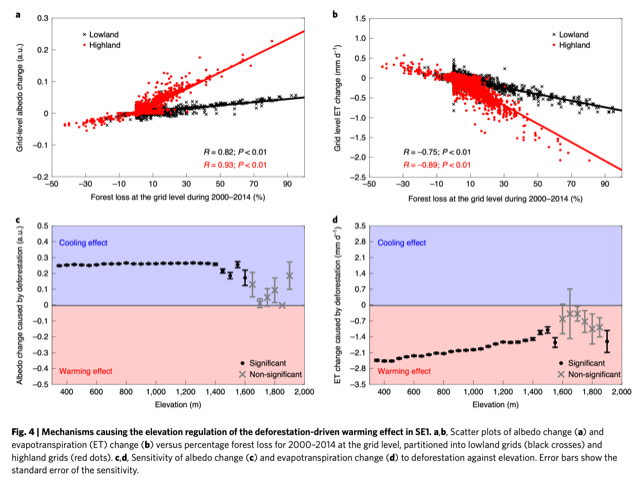Deforestation-induced warming over tropical mountain regions regulated by elevation

Zeng, Z., et al. (2020) “Deforestation-induced warming over tropical mountain regions regulated by elevation”, Nature Geoscience, doi:10.1038/s41561-020-00666-0.
Abstract:Agriculture is expanding in tropical mountainous areas, yet its climatic effect is poorly understood. Here, we investigate how elevation regulates the biophysical climate impacts of deforestation over tropical mountainous areas by integrating satellite-observed forest cover changes into a high-resolution land–atmosphere coupled model. We show that recent forest conversion between 2000 and 2014 increased the regional warming by 0.022 ± 0.002 °C in the Southeast Asian Massif, 0.010 ± 0.007 °C in the Barisan Mountains (Maritime Southeast Asia), 0.042 ± 0.010 °C in the Serra da Espinhaço (South America) and 0.047 ± 0.008 °C in the Albertine Rift mountains (Africa) during the local dry season. The deforestation-driven local temperature anomaly can reach up to 2 °C where forest conversion is extensive. The warming from mountain deforestation depends on elevation, through the intertwined and opposing effects of increased albedo causing cooling and decreased evapotranspiration causing warming. As the elevation increases, the albedo effect increases in importance and the warming effect decreases, analogous to previously highlighted decreases of deforestation-induced warming with increasing latitude. As most new croplands are encroaching lands at low to moderate elevations, deforestation produces higher warming from suppressed evapotranspiration. Impacts of this additional warming on crop yields, land degradation and biodiversity of nearby intact ecosystems should be incorporated into future assessments.
